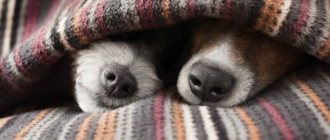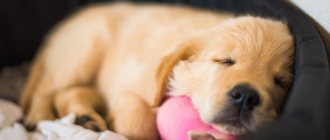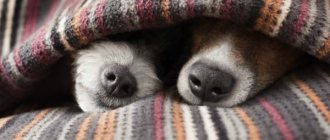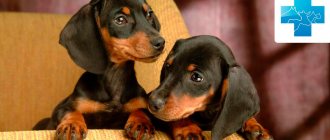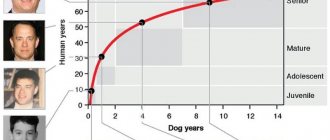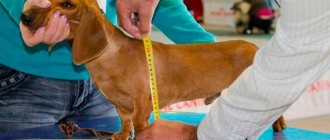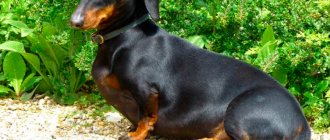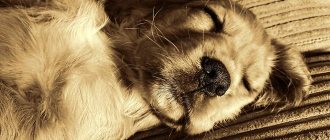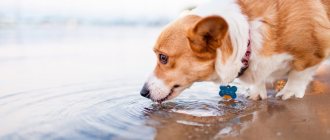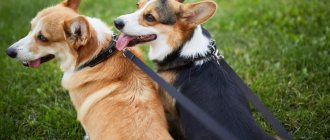The four-legged animals sleep at night, but sometimes wake up and like to take a nap after eating and walking. And besides, if a dog lies with his eyes closed, this does not mean that he is sleeping. Are you worried about your pet's condition? Does he look tired and sleep-deprived? Or are you just wondering how much dogs sleep per day? In any case, let's look at the data that is available to us.
Stages of sleep in dogs
The sleep structure of dogs and humans is identical, except that the duration of the periods is different. At each stage, the brain experiences stress, and certain processes occur in the body. Sleep is usually divided into several types:
- Napping - the animal is fully conscious, controls the situation, but behaves relaxed. This stage is considered as a temporary rest to recuperate or the first stage of falling asleep.
- Shallow – active tissue repair processes are launched in the body, the dog is completely relaxed, but can hear sounds around him.
- Deep is the only stage of complete muscle rest. Typically, at this stage, you can see the dog moving its lips or twitching its paws.
- Fast is a relatively recently discovered stage. At this stage, the dog is completely motionless and relaxed, but you may notice rapid movement of the eyeballs. After REM sleep ends, the dog either wakes up or falls back into light sleep. By the way, a person remembers his dreams in detail if he woke up immediately after the REM stage of sleep.
Important! Deep sleep is the only state of the body when the immune system works at full strength.
What sleeping dog poses say
Each dog chooses a sleeping position depending on its individual preferences, so even siblings can sleep completely differently.
Additional Information! The posture is influenced by many factors: age, room temperature, pet’s mood. When it's cold, dogs sleep curled up, and when it's hot, they can stretch out at full length on the floor.
Your mood also affects your posture. When a dog feels safe, it completely relaxes and takes strange poses. For example, he lies on his back with his paws outstretched. While sleeping in this position, all weak points are exposed, so the pet can only assume this position in the most comfortable environment. In addition, in this position all muscles are as relaxed as possible, which cannot be said about other poses. So the dog will lie down only if it is confident in its safety and is in the house or next to the owner.
During and after pregnancy, dogs, regardless of breed, be it a Chihuahua, Spitz, Pug or Shepherd, choose a position that allows them to quickly jump up and protect the offspring.
Age
Puppies up to 2-3 months old seem to sleep around the clock. They fall asleep while walking and with their faces buried in the bowl. This is an absolutely normal phenomenon, since tailed babies sleep up to 20 hours a day. Puppies do not yet need to guard the territory, they are well-fed and immune to irritating environmental factors... that is why they sleep and do not doze. Growing up babies become more active, continue to eat a lot, go for walks, get tired and also sleep for a long time - up to 18 hours a day.
Note! Whining, pawing, and even jumping up in sleep are not alarming symptoms. It is believed that dogs, like people, are capable of seeing and experiencing dreams. But walking with half-closed eyes in a state of apparent sleep is already a neurological disorder.
Older dogs again increase their sleep time to 20 hours a day, but it all depends on the breed. Many representatives of the canine world remain active until a very advanced age. An older dog (7–10 years old) sleeps all night, after every meal and walk. Given the general slowdown in metabolism and increase in sleep time, older pets are reduced in caloric intake. Otherwise, the four-legged dog will look constantly tired and exhausted.
How do dogs sleep?
The natural need for sleep is genetically inherent in the dog. The program depends on environmental factors. With a good owner, the animal falls asleep after a hearty meal, walks down the street, enters a deep sleep phase at night, and feels alert in the morning.
Street dogs, deprived of proper care, sleep when they should and sleep little. The animal must be constantly alert and aware of its environment. Therefore, they often look tired, sick, irritated and angry.
Interestingly, climate conditions also affect how long a dog rests. In cloudy or rainy weather, most breeds will happily take a nap in a secluded, curled up area. A bright, sunny day will make your pet feel alert, active, and alert.
On a note! In the heat, the nodules become calmer and more measured. This condition makes them drowsy.
Poses
The position in which a dog sleeps can tell the owner a lot about his health. The most natural and comfortable position is the embryo or “ball”. Then the animal will be able to relax as much as possible. The grouped muscles of the abdomen and back appear to cover the internal organs and head, giving the animal a sense of security.
Also, don't worry if your dog sleeps with his legs extended, lying on his side in a pancake position. Other positions in which the animal likes to sleep: on its back, leaning against the owner, in the “horse” position.
Important! You should sound the alarm if your pet begins to sleep on its stomach, in a confined space, or grabs its head with its paws. This is the first sign of the development of some disease.
Loads and general “atmosphere” of the environment
When a dog has nothing to do, it eats or sleeps. In principle, this axiom is true for all living beings. If we consider a young and healthy pet, then the duration and quality of sleep will greatly depend on the loads received. A tailed dog, bored within four walls, dozes most of the day, a dog that has been walked and tired sleeps in a long and deep sleep. The conclusion is obvious - for the full functioning of the body, maintaining health and psyche, the dog must receive exercise and sleep, albeit not for such a long, but deep sleep.
Possible violations
To understand whether your dog has a lack of sleep and whether it needs to be compensated for, you need to understand the reasons why sleep may be disturbed:
- Little physical activity - don’t be lazy, go out and play with your pet outside, rest assured, this is one of the best cures for problems in a person’s life too.
- Behavior - dogs are smart and cunning creatures. For example, you got up to go to the toilet at night, and your pet tearfully asks for food, although he just recently devoured a full bowl. You generously pour him some food, and the situation will definitely repeat the next night, since this has already worked before. Gradually, this will begin to turn into a habit, which will not be so easy to get rid of. Here you can give one piece of advice - don’t let the dog manipulate you.
- Health – If your dog can’t sleep, it’s most likely due to his well-being. All sorts of pain and digestive problems can affect sleep. It’s better not to experiment and show your friend to the veterinarian.
- Nervous overexcitement and stress - dogs can also worry and not sleep at night because of this. Don't reject your dog because he woke you up at night, pet him, talk to him, let him calm down.
- Hunger - make sure your dog’s bowl is full. Malnutrition can become an ardent opponent of sleep, and then he will still have to use manipulation to eat.
Listen to your pets, they will not bother you over trifles. Don't forget to play and talk to them, because they love their owner's attention.
- Author: Elena Romanenko
Rate this article:
- 5
- 4
- 3
- 2
- 1
(2 votes, average: 3.5 out of 5)
Share with your friends!
Thermoregulation of newborn puppies
In the first week of life, babies do not have a proper thermoregulation system. Even if they are cold, their body will not tremble. So you will have to monitor the temperature in the bed if they grow up separately from their mother, or make sure that they are always close to their mother. To keep the temperature normal and the puppies not to freeze, it is necessary to place them close to each other. If the cot is colder than +30°C, there is a chance that the babies will freeze.
Short-term mild hypothermia will not harm the puppy’s health, but, on the contrary, will strengthen the immune system. This way the puppy will gradually get used to growing in natural conditions. But longer hypothermia can threaten the puppy's life. This problem can be solved by placing an electric heating pad in the baby's bed. Remember that it does not need to be installed over the entire area where the puppies live. If the bitch gets hot, prepare a place where she can move without leaving the children.
Why does the dog tremble and shake?
Small dogs of decorative breeds, especially Chihuahuas, Yorkshire terriers, and Pomeranians, are characterized by a physical condition such as trembling and shaking. Many inexperienced owners of their pets, not knowing the cause of this condition, run to the veterinarian for help, thinking that their sneeze, Yorkie or Spitz is sick with something. Let's look below at all the possible causes of this condition.
Causes of trembling and shaking in dogs
Cold.
One of the most common reasons why a dog trembles and shakes is low air temperature, a feeling of cold. Since Chihuahuas, Yorkies and Spitz are small dogs (up to 3.1 kg), they are very susceptible to cold temperatures. Both humans and dogs, when feeling cold, instinctively begin to shiver and shake, thus accelerating the flow of blood through their body in order to avoid hypothermia
If you notice this feature of your pet during the cold season (autumn, winter) at home or while walking, be sure to pay attention to this and warm your pet
Anxiety, fear, fear.
Almost all small breeds of dogs begin to tremble and shake when they experience feelings of fear, anxiety and fright. This state of sneezing, Yorkie and Spitz can be caused by a stressful situation, punishment of the dog for the trouble it has caused, or the dog itself feels guilty. For example, we can cite a situation where a puppy went to the toilet in a place other than the one indicated to him and then went to hide either in his house or somewhere secluded, while he trembles violently, like an aspen leaf, knowing that his they will scold. Another clear example, perhaps almost every one of you has observed, is when a miniature dog begins to shake and tremble at the sight of a large dog, while feeling a sense of fear and threat, hiding, hiding Source
Feeding newborn puppies
Puppies often do not gain weight in the first few days.
Puppies are born with an innate sucking reflex. However, weak babies who are unable to latch on to the nipple themselves must be held until they have received their share of milk. Apply them to the fuller nipples. First, knead the bitch's chest and express the colostrum so that the puppy can smell it. So he will need to be fed for several days. Then the puppy will get a little stronger and will be able to feed on its own.
Useful information: Healthy babies know how to grasp the nipple tightly, they lift their tails up, sleep well, and have wet noses. If there are lethargic and inactive ones, they need to be shown to a veterinarian.
It is very important to weigh a newborn puppy and subsequently monitor how he gains weight and how much food he takes at a time . If the baby is very weak and cannot suck even a drop on his own, he will need to be fed every 1.5 hours from a pipette, syringe or pacifier. To do this, express the mother's milk and give it to the puppy little by little. For the first time, 1 milliliter will be enough.
Why does a dog spin around before going to bed?
Dogs are funny creatures, many of whose actions touch their owners. But strange behavior often hides instincts that pets inherited from their ancestors. For example, when a dog starts to spin around before going to bed.
Many dogs begin to fidget in one place for a long time before lying down. This is due to the fact that the dogs’ ancestors trampled the grass for a long time to make the place safe. For example, a snake or some other dangerous animal may be hiding in the grass. It's also a way to make yourself a more comfortable place. Although dogs have been sleeping on soft beds in warmth and comfort for a long time, the habit of spinning around before bed is still preserved.
Important! Your pet will have the deepest sleep if it sleeps next to its owner. Also, falling asleep together has a positive effect on the person himself.
Proper care for puppies at 1-2 months
When babies are one month old, they need to be wormed. To reduce the likelihood of parasites appearing, you need to do this several times. Anthelmintics are given 2 times with a ten-day interval. When you feed the tablet to your puppy, make sure he swallows it.
It is important that your baby receives the exact dose that is appropriate for his weight and age. To do this, carefully read the instructions before performing the procedure. Any drug contains an insert sheet in which everything is described in detail.
Helpful information: Puppies instinctively do not go to the toilet where they eat and sleep, so prepare a tray in which they can relieve themselves. At two months of age, the baby prefers to always defecate in one place.
At 2 months it becomes clear what character the baby will have in the future
On the 45th day of life, puppies become active and get used to the world around them. At this age they can be given nicknames. They already recognize the person who has been caring for them all this time, and as a sign of gratitude they lick his hands and play with him. Only at 2 months does it become clear what character the baby will have in the future. From about this age, it is necessary to devote more time to puppies and play with them, since character depends not only on the characteristics inherent in genes, but also on experience in communicating with humans. After 2 months, older, active and playful babies can go to new owners.
First food for puppies
Initially, feed puppies only one type of complementary food.
Weaning is an important and even critical period for a puppy, which can be harmful to health. But everything will be fine if you know how to do it correctly and carefully monitor your diet. This period will be especially dangerous for weakened and developmentally delayed puppies. Try to gradually make changes to your baby's diet.
It is very important that puppies are initially fed only one type of complementary food. This should be done no more than once a day. Allow your growing body to get used to minor changes so that problems do not arise in the future. Make sure that the babies are absorbing the new food well, and only then increase the dosage.
Gradually expand the puppy's diet
The next step is to offer the puppies supplemental food twice a day. Then gradually expand the diet and feed three times a day. Gradually increase the amount of new food until the bitch is completely weaned. Babies can be completely removed from mother's milk at 5-6 weeks. Let us emphasize once again: it is very important to do everything gradually so as not to harm the health of the puppies. Warm complementary foods to the temperature of mother's milk (approximately +38°C).
You can add boiled chicken fillet to your diet. Rabbit meat is also ideal for complementary feeding. At the age of 5-6 weeks, babies need to be fed 5 times a day, of which 3 with dairy products, 2 with meat and porridge. Sometimes you can give puppies some boiled fish. Be sure to check the pieces well before giving them to your little ones to avoid any bones.
Be sure to feed your puppies fermented milk products (cottage cheese and bifilin). Boil an egg several times a week and feed only the yolk to the children. You can also dilute your diet with rice porridge with meat. It is important that the rice is boiled and does not clog the puppies’ stomach. For variety, include special soaked dry food in your baby's daily menu.
When using premium food, no nutritional problems will arise, but only if you consistently and correctly follow all the recommendations for using this product. Around this time, the bitch will already be tired of her children and will spend time with them only at night.
Congenital pathology
Congenital diseases of the heart and blood vessels, nervous system, and endocrine glands often lead to a decrease in body temperature - hypothermia. Normally, a pet's temperature should exceed 37 degrees. At low temperatures, metabolic processes in the dog’s body slow down and it becomes lethargic. Severe trauma during childbirth can cause serious damage to the nervous system, causing a decrease in the animal's activity. Such a diagnosis cannot be established independently. This is done by a veterinarian after a thorough examination.
Weakness and intoxication may be associated with skin diseases. The animal itches all the time, hair is constantly coming out. Red spots of inflammation are visible on the skin.
Tumors of various locations may also present with drowsiness. A complete cure is possible for the disease at an early stage. After identifying the location of the tumor, surgery is performed to remove it. X-rays and ultrasound will help in diagnosis.
Chronic illnesses can lead to decreased activity. If you suspect them, visit the veterinarian for a routine examination, possibly take tests (blood and urine) and conduct a more in-depth examination of the dog. Any pathology detected at an early stage can be completely cured.
Drowsiness is not a disease, but a symptom. Treating it at home is pointless and useless. Perhaps the puppy is simply too small for active play and wants to sleep. But if the animal refuses to eat and does not want to go for a walk, immediately contact a veterinarian. In any case, it won’t hurt to undergo a preventive examination.
First week of life. How to properly care for puppies?
In the first weeks after birth, puppies mostly eat and sleep.
Around the 8th day, you need to trim the puppy’s nails for the first time, and then repeat the procedure every week. This should be done so that the baby does not scratch the mother’s delicate skin around the nipple while sucking milk. Only cut off the sharp edges, the so-called hook tips.
Newborns may develop health problems in the first days, so they need to be closely monitored. When intestinal infections appear, an unpleasant sour smell will appear in the bed, and yellow marks from the disorder will remain around the butt. Then weaker puppies may die literally on the first day.
Useful information: The main cause of infection may be inflammation of the navel stump. Bacteria can enter when a bitch with bad teeth chews and licks the umbilical cord. For prevention, lubricate the stump with brilliant green several times a day.
In the first weeks after birth, puppies mostly only eat and sleep. Don't be alarmed if babies twitch during sleep - this is normal. In the first weeks of life, their eyes and ear canals are closed.
Babies open their eyes for the first time from the 11th to 15th day of life. The rumor appears a little later, on the 18th day. Normal body temperature for a newborn is 34.5-36°C.
The third week of babies’ lives is full of interesting events and new discoveries, as they begin to walk and explore the territory not only in the bed, but also outside it. At this age they become very pretty, playful and active. They begin to get out of their corner and go to the toilet (tray, diaper or newspaper).
At the fourth week of life, puppies begin to erupt their first teeth. The fangs come out first. This usually happens on days 21-25. As soon as the first teeth appear, you can start feeding the puppy. Over time, mother's milk will gradually begin to disappear, so if the baby gets used to a different diet by then, it will not be stressful for him. At first, give only special milk, and then, as they grow older, add other healthy foods to the diet.
When should you contact a veterinarian?
Dr. Potoski says, “I would recommend taking your dog to the vet if he becomes extremely lethargic. Anything that goes beyond her usual behavior should alert you and be a reason to visit a specialist.” As a dog owner, you are the best person to tell what dog behavior is normal and what worries you. When you see changes that are concerning, consult your doctor!
No wonder they say that a dog is man's best friend. Many of us love them as much as we love family members, and taking care of their health is just as important. This is another reason to find out how long dogs should sleep.
Source
What to do after the birth of puppies?
Take time off from work so you can spend as much time at home as possible. This way you can observe how the bitch behaves, especially if this is her first litter. Note for yourself the important moments of your mother’s behavior. If you plan to regularly breed puppies in the future, the experience gained will be invaluable to you.
During a normal birth, and if the bitch is already experienced, it will not be difficult to care for the babies, since from birth they already have certain reflexes . An adult dog has a very strong maternal instinct. If this is not the first litter, the bitch will carefully look after the children, carefully licking them, protecting them and feeding them.
Newborn puppies. Care in the first days of life
Newborn puppies are blind and deaf
Babies are born blind and deaf, however, thanks to instincts, from the first hours of life they are able to independently find their mother's nipple . The feeding process usually looks like this: the puppy attaches itself to the chest and begins to massage the area around it with pushing movements with its front and back paws. This helps produce and supply more milk. An important point: it is necessary to put babies to the breast in the first hours after birth so that they eat nutritious colostrum. It contains many vitamins, proteins and other useful substances. The baby’s immunity will be strengthened, and various infectious diseases will not be scary for the growing body.
In the first few days after birth, puppies cannot empty their bladders or bowels on their own. The bitch does this for them, diligently licking the babies and eating all the secretions. Therefore, newborn puppies lie dry and clean, and there are no marks on the bed. Blind and deaf babies mostly just sleep and suck, rapidly gaining weight. If the puppies do not squeak, it means they are full.
Place to sleep, Husky sleep style
Your puppy should have his own corner, and don’t be confused by the small dimensions of the apartment.
Huskies won't take up much space. The puppy needs a dry place where there are no heating devices and where the sun's rays will penetrate. You should not choose housing for your puppy in the kitchen, bathroom or glassed-in loggia. Remember that moderate temperature conditions are important for dogs. Being constantly in very warm rooms, the husky will eventually lose its natural mechanisms of temperature adaptation and easily catch a cold even when the window is opened. Also unfavorable housing areas for a puppy are places where a TV, home theater and other appliances are installed. Loud sounds from stereo systems shake a dog's psyche, and the presence of electrical wires in visible conditions can lead to dire consequences.
It is very important that the room where the dog lives is regularly ventilated and out of reach of tobacco smoke and other strong odors.
Having decided on a place, you need to accustom the puppy to it. To do this, you need to introduce him to him. In this case, it is advisable to stroke the puppy and say that this is his place. The command should be pronounced firmly. If the puppy does not immediately get used to the place, he needs to be moved there when he goes to bed, and the command “place” is given in a more confident tone.
The puppy will remember its place after several such exercises. Three days are enough for a husky puppy to go to sleep on its own bed.
Huskies are very attached to people, which explains their reluctance to be left alone. Therefore, you should not send your dog out if it wants to sleep on your legs or starts following you around. This is how huskies express their care and devotion.
